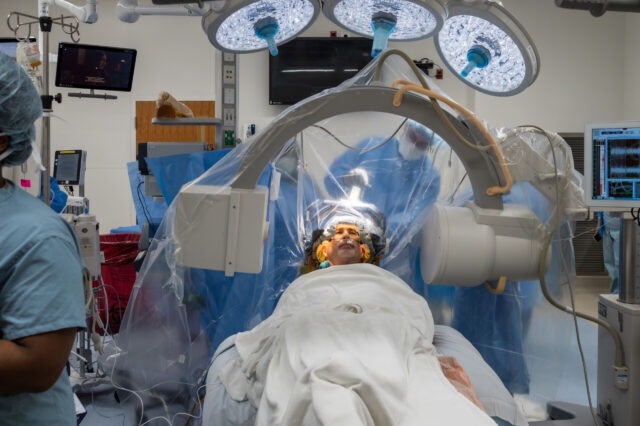Neurological disorders can disrupt your daily life and limit your everyday functionalities. Common neurological conditions like Parkinson’s disease cause tremors and dystonia. When other treatments fail to provide sufficient relief, Deep Brain Stimulation Surgery (DBS) offers a promising alternative. Read this detailed guest post on DBS, how it works, and why it’s an effective option for managing severe neurological disorders.
What Is Deep Brain Stimulation Surgery?
Deep Brain Stimulation Surgery is a specialised procedure to control symptoms of chronic neurological conditions. The surgery involves implanting tiny electrodes into specific areas of the brain. These electrodes connect to a device called a neurostimulator, which sends electrical impulses to regulate abnormal brain activity.
DBS targets the brain regions responsible for tremors or uncontrolled movements. DBS is direct and provides sustained relief, focusing solely on the affected areas without causing side effects.
How Does Deep Brain Stimulation Surgery Work?
DBS is a carefully planned procedure that unfolds in three key stages:
1. Pre-Surgical Evaluation
Doctors conduct a detailed evaluation, including imaging tests such as MRI or CT scans, to pinpoint the brain regions causing symptoms. This helps ensure precision during the surgery.
2. Surgical Implantation
In the next step, electrodes are implanted in the brain through minimally invasive techniques. A neurostimulator is placed under the skin near the chest, which powers the electrodes.
3. Activation and Adjustment
A few weeks after surgery, the neurostimulator is activated. The device’s settings are adjusted to deliver the right level of stimulation, tailored to the patient’s needs. Hospitals with advanced technology and skilled neurosurgeons, such as those at Nanavati Max Super Speciality Hospital, are equipped to handle the complexities of this procedure.
Neurological Disorders Treated with DBS
DBS has proven effective in treating a range of conditions that are difficult to manage with conventional therapies. Some examples include:
1. Parkinson’s Disease
DBS significantly reduces symptoms like tremors, stiffness, and slowed movement. It allows patients to regain mobility and reduce their dependency on medications.
2. Essential Tremor
This condition causes uncontrollable shaking, making simple tasks challenging. DBS helps patients regain control, enhancing their quality of life.
3. Dystonia
DBS targets abnormal muscle contractions, improving movement and reducing pain for those with this condition.
4. Epilepsy
By interrupting erratic brain signals, DBS reduces the frequency and severity of seizures in certain cases.
5. Obsessive-Compulsive Disorder (OCD)
For individuals with severe OCD who haven’t responded to other treatments, DBS provides a targeted approach to reduce obsessive thoughts and compulsive behaviours.
Advantages of Deep Brain Stimulation Surgery
Patients undergoing Deep Brain Stimulation Surgery experience a range of benefits that improve their day-to-day life. For instance:
- Symptom Relief: DBS directly reduces tremors, stiffness, and other symptoms associated with neurological disorders.
- Long-Lasting Effects: DBS provides consistent and ongoing symptom relief.
- Adjustable Treatment: Doctors can customise the neurostimulator’s settings to meet individual needs, ensuring optimal results.
- Reduced Medication Dependency: Many patients require lower doses of medication after DBS, reducing side effects like drowsiness or nausea.
These advantages make DBS a reliable option for patients seeking long-term management of their neurological disorders.
Safety and Risks of DBS
While DBS is generally safe, some risks are associated with the procedure, such as infection, bleeding, or device-related complications. For example, patients may experience mild side effects like headache or dizziness during the adjustment phase. However, these are typically temporary and manageable. Hospitals with advanced facilities, such as Nanavati Max Super Speciality Hospital, prioritise patient safety and ensure proper care during every stage of treatment.
Why Choose Advanced Hospitals for DBS?
When considering DBS, it’s important to choose a hospital equipped with advanced technology and experienced professionals. In leading hospitals like Nanavati Max Super Speciality Hospital, patients benefit from personalised treatment plans tailored to their unique condition. The hospital’s surgical types of equipment, combined with the expertise of its neurologists and neurosurgeons, ensure the highest standard of care.
Is Deep Brain Stimulation Right for You?
DBS is suitable for people who experience severe neurological symptoms that don’t respond to medications. For example, individuals with Parkinson’s disease or dystonia who struggle with mobility issues may find DBS to be life-changing. Doctors perform extensive evaluations to determine if DBS is the right choice for you.
Know more about : Brain Surgery For Children: How It Works?
Conclusion
Deep Brain Stimulation Surgery is transforming how neurological disorders are managed, providing hope to patients who struggle with debilitating symptoms. For those exploring this advanced treatment, choosing a trusted hospital with experienced professionals, such as Nanavati Max Super Speciality Hospital, can make all the difference. Consult a specialist today to learn how DBS can be a step toward better health.
